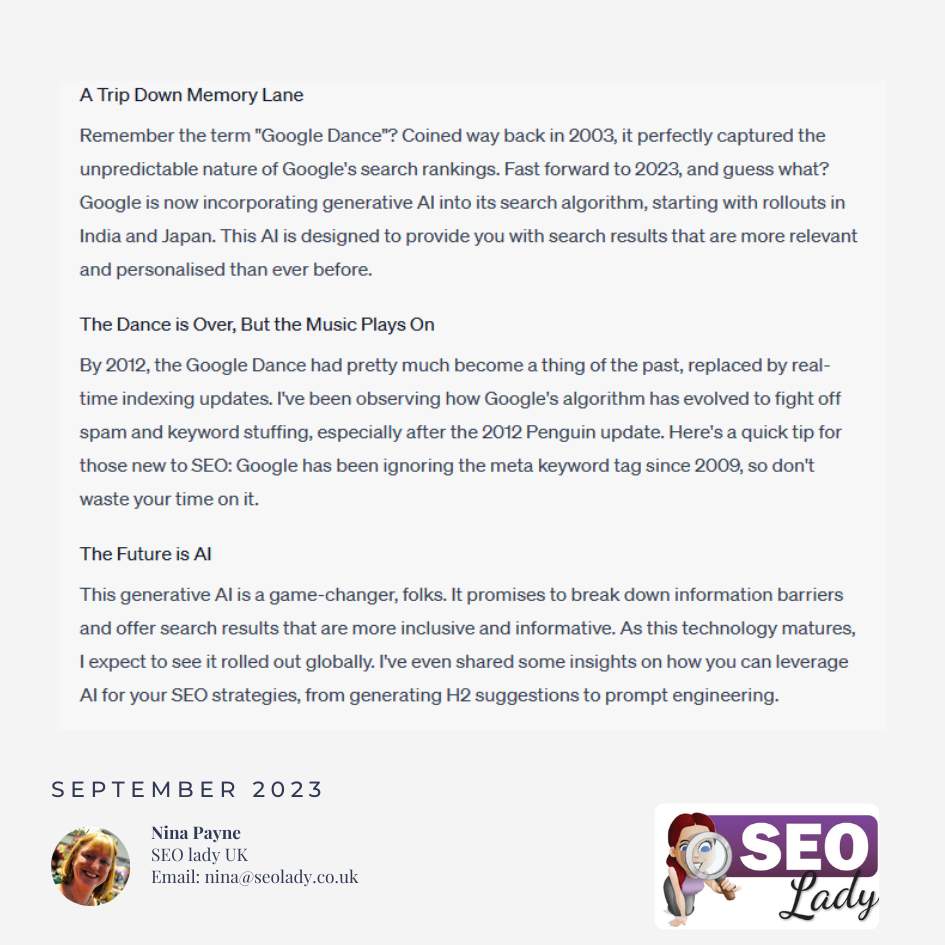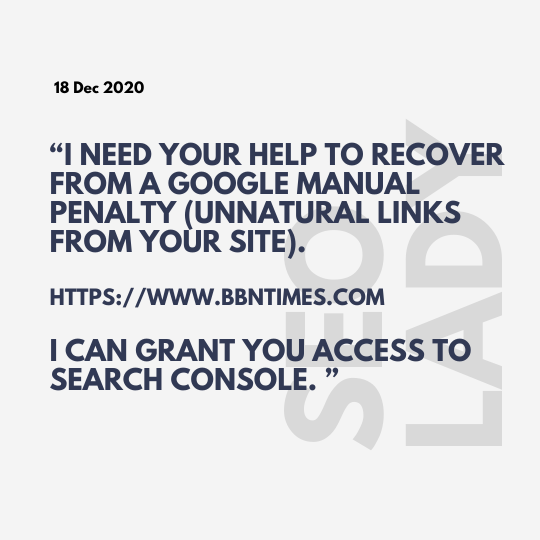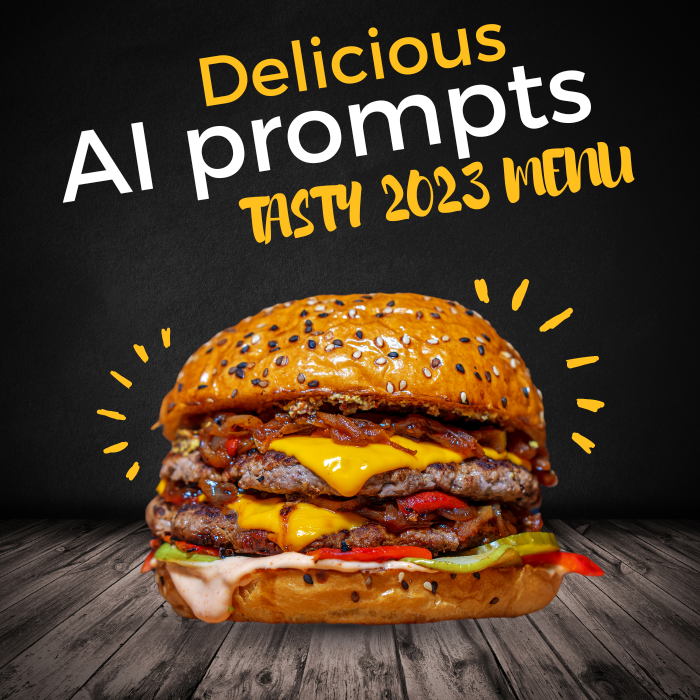This is a 2023 Google Dance Core Update update to my last 2020 post, which was the last time I wrote about the Google core update. I thought it would be interesting to see the comparison intermingled with my own thoughts and personal opinions.
For non-technical readers, I speak your language, so this article is in two voices. If you’d like to upskill your team of bloggers and content writers, consider booking an SEO Training day in your closest UK city, or on-site at your office location.
Google Dance 2023 Core Update - Generative AI in Search SEO News and Video from Barry
The earliest known mention of the phrase “Google Dance” is in a blog post from 2003 before the term ‘core update’ became the new algorithm moniker. You should know this if you’re old and grey like myself, if not, send me a message if your domain has been affected by the latest Google’s algorithm update.
Twenty years later, Google is expanding the availability of generative AI in Search to India and Japan as of September 2023. This will help users in these countries find more relevant and helpful information when they search. As of now, the GAI capabilities are only launching in these counties. Google intend to roll out these features to more countries in the future once it gathers learnings from these initial launches.
Barry Schwartz (@rustybrick on X) published the above video on a Search Engine Roundtable blog update.
Generative AI uses advanced machine learning techniques to deeply understand the meaning and intent behind search queries. It can then generate helpful results tailored to what the user is looking for. This includes surfacing relevant images, videos, and text snippets that may not have existed on the open web before.
Google is committed to continuously improving Search to be more helpful, inclusive and informative for all users. Generative AI is an important new capability that can aid in this mission. While not perfect, it has enormous potential for breaking through information barriers. As the technology develops further, expect to see generative search features launch in more regions globally.
From the Google Dance of 2003 to the Core Update of 2023: How Google's Algorithm Has Evolved
Death of the “Dance” – By 2012, with real-time indexing updates, the noticeable monthly rankings changes dissipated for most sites. The catchphrase became far less prominent, and is now a legacy term; a more of a nostalgic term referring to the era of monthly major ranking shifts.
20 years ago it was commonplace to buy a keyword rich domain to rank faster in Search, Google then realised it was being exploited and adjusted their algo to reflect this hack.
Additionally, Google’s algorithm was heavily reliant on links back then, and the number and quality of links to a website could change rapidly. Of course, some chose to exploit this reliance on links. Enter 2012’s Penguin update. Penguin delivered a crushing blow to spammy practices like keyword stuffing and sketchy link schemes. Manipulative tactics would no longer fly in Google’s ecosystem.
A lot of baby SEO’s rely on outdated whispers from their communities or see SEO Advice on X. I can teach you the latest methods on how to use AI to help with SEO, from H2 suggestions, to out of the box prompt engineering when you book me at your location for Organic SEO training courses. Invest in your employees and reap the benefits.
In August 2023, Google webmaster trends expert John Mueller had to tweet that the meta keyword tag has been ignored since 2009 as he’d been asked by a newbie.
John also confirmed that adding a location name in a URL has no positive or negative impact on how pages are ranked in search.
SEO Lady tip: Always keep your URLs as short as you can and SEO location pages, or your ‘contact us’ page with embedding a Google map. Avoid canonical blog tags and 301 redirect old ones that are unlikely to be used again.
While Google continues to release algorithm changes, they changed from the old dancing way of flicking a switch; the gradual rollout method used in 2023 has the purpose of reducing large fluctuations and frustrations. This is to combat an overnight domain bombing in search, like in the twenties with the first introduction of E-A-T and HTTPS-favoured urls in their algorithm changes.
The volatility of Google’s search results in the early days of the search engine, was caused by a number of factors – including the fact that Google’s algorithm was still under development and that the search engine was constantly being updated.
The Google Dance was a major source of frustration for website owners and SEO professionals. It was difficult to predict how a website’s ranking would change, and it was often impossible to know why a website’s ranking had changed, in the mid-2000s it levelled out as Google’s algorithm became more sophisticated. However, the term “Google Dance” is still used today to refer to any sudden or unexplained changes in Google’s search results from older generation of online marketers.
The phrase became more widely used in 2004, when Google’s algorithm was updated and the Google Dance became more pronounced.
The Google Dance began to subside in the mid-2000s, but the phrase is still used today to refer to any sudden or unexplained changes in Google’s search results.
LLM's and AI: Hand in Hand Search Engine Optimisation
It’s easy to take the complexity of ranking for granted. But behind that simple search box is decades of innovation that changed how the world finds information.
2013 brought Hummingbird, strongly underlining semantic search capabilities. Google could now parse words in context rather than exact match. No more clumsy results for homonyms like Jaguar the car versus the animal!
Two years later RankBrain reinforced Google’s machine learning muscle. Now algorithms could intuit query intent, delivering intelligent results for even never-before-seen searches.
Most recently, BERT in 2019 enabled natural language nuance. Google could grasp complex questions, synonyms, slang and more. Smarter ranking for a smarter era.
From backlinks to neural networks, Google’s journey has been remarkable. And these updates laid the foundation for innovations yet to come. Our work as SEOs never stands still…and neither will Google!
SEO lady Tip: So as algorithms continue to evolve in 2024, let’s remember to champion sites that offer true value for users. Always triple check your facts by searching by ‘date’ for corresponding articles and comparing at least three, to verify they all offer the same advice or purpose.
Google's Decades of Domination - The Global Behemoth
This has been the case since the big G was accessible to the public domain in 1998. PageRank was first launched, this brilliant system judged links between websites to measure authority and relevance. While primitive by today’s standards, PageRank laid the groundwork for search to surface the best results first.
Please remember that Google core updates are not intended to punish websites. Google core updates are released on a regular basis, and they can have a significant impact on the ranking of websites. This can be a concern for stakeholders, board members, and shareholders, as it can affect the visibility and traffic to their website
They are simply designed to make sure that the best websites are ranked at the top of search results. By staying informed about Google core updates, you can help to ensure that your website is not adversely affected by these changes.
I swapped from Ask Jeeves to Yahoo! and Google and remember when Yahoo dismissed the purchase of Google for a mere $1billion in ’98.
Only for the major development of a backpedal and tumultuous internet change just 2 years later.
In June 2000 Yahoo! announced that all web searches conducted on their site would now be powered by Google as part of a new partnership agreement. Salty much?
Changes in Google's Algorithm over 20 Years - I Put The "SEO" In "SEOphisticated" Content
Google’s Search Central blog was first published in 2006. The blog posts typically include information about the specific changes that Google is making to its algorithm, as well as tips for website owners to help their websites stay in good standing.
Some of the significant changes that Google has made to its algorithm over the past 20 years include:
It’s easy to take the complexity of ranking for granted. But behind that simple search box is decades of innovation that changed how the world finds information.
Let’s go back to 1998, when PageRank first launched. This brilliant system analyzed links between websites to measure authority and relevance. While primitive by today’s standards, PageRank laid the groundwork for search to surface the best results first.
Of course, some chose to exploit this reliance on links. Enter 2012’s Penguin update. Penguin delivered a crushing blow to spammy practices like keyword stuffing and sketchy link schemes. Manipulative tactics would no longer fly in Google’s ecosystem.
2013 brought Hummingbird, emphasizing semantic search capabilities. Google could now parse words in context rather than exact match. No more clumsy results for homonyms like Jaguar the car versus the animal!
Two years later RankBrain reinforced Google’s machine learning muscle. Now algorithms could intuit query intent, delivering intelligent results for even never-before-seen searches.
Most recently, BERT in 2019 enabled natural language nuance. Google could grasp complex questions, synonyms, slang and more. Smarter ranking for a smarter era.

From the Cha Cha Slide to the Electric Slide: Core Algorithm Shifts Through the Ages
Top 10 Most Popular LLMs in order of daily global traffic and user demographics
Of course I intend to update this list for 2024, but for now the artificial intelligence and Large Language Models popular in September 2023 are:
- ChatGPT (OpenAI)
- LaMDA (Google AI)
- Turing NLG (Hugging Face)
- Bard (Google AI)
- DialoGPT (OpenAI)
- Meena (Google AI)
- GPT-3 (OpenAI)
- T5 (Google AI)
- Transformer-XL (Google AI)
- BERT (Google AI)
So there you have it, my take on Google’s algorithm evolution from the Google Dance to the 2023 Core Update. Whether you’re new to SEO or a salt n pepper haired veteran, my blogs are always written by myself to maintain the freshest knowledge in this ever-evolving online landscape.
TL;DR Summary:
With search engine optimisation strategies constantly evolving, it’s critical to fact check any SEO advice you come across online, whether on social platforms or in your SERPs output. Before making major changes to your website, verify recommendations by cross-referencing multiple authoritative sources. Blindly following random blogs or forums without scrutiny can damage.
This is especially important when exploring emerging techniques like AI content creation. Inexperienced users risk generating “word salad” or nonsensical text that can severely damage a site. Always start small and run tests before overhauling your content. Review samples carefully to check for hallucinations – completely inaccurate or fabricated information. Vet any SEO consultant by asking for case studies offering AI services to ensure true expertise.
Invest in training your team on the latest SEO practices; it’s worth every penny and cheaper than hiring a high flying on-page SEO consultant, benefit from 30 days of support, recaps and video advice.
How to avoid AI Hallucinating Content: Check, check and check again. Avoid copy and pasting and add your own voice.
Remember: caution and innovation are not mutually exclusive. There are no quick wins with Google ranking and organic content generation. By leaning on proven best practices and cautiously embracing new strategies, you can adapt and thrive in this dynamic ecosystem. Keep your eyes open, but also keep your feet firmly planted on the ground.
Beware of False SEO Prophets
In the world of SEO, not all that glitters is gold. There are plenty of unverified sources out there promising miraculous results with minimal effort. If something sounds too good to be true, it probably is. Always cross-reference any new tips or strategies across multiple experts to ensure you’re not falling for an SEO myth.
Trust But Verify, Verify and Verify again
New tactics and strategies are always popping up, promising to be the next big thing in SEO. While it’s tempting to jump on the bandwagon, it’s crucial to exercise caution. Before you implement any new strategy, take the time to validate its effectiveness. Consult multiple sources, run small-scale tests, and measure the results meticulously. If a tactic hasn’t been widely adopted or endorsed by reputable experts, it’s worth approaching with a healthy dose of scepticism.
Before you start experimenting with the latest SEO hacks or AI gimmicks, make sure you’ve got the basics down BEFORE you make ginormous changes to your CMS or cPanel. Proven best practices are called ‘best’ for a reason – they work.
The sweet spot lies in combining tried-and-true methods with measured experimentation. Once you’ve built a solid foundation, you can start to cautiously incorporate cutting-edge strategies into your SEO plan.
The key is to do this incrementally, monitoring the impact of each new tactic as you go. This balanced approach allows you to adapt to the ever-changing SEO landscape while minimising risk.
Google Core Update - How 3 years have changed
One of my long term clients was in the process of swapping out Local SEO targeted geographically to focussing on UK Nationwide search phrase ranking. This coincided with the 17th November Google core update which had a medium volatility and seemed to react well to Skyscraper content 1,000 word blog posts and articles written a relevant YouTube video embedded.
During my monthly schedule of work, I went back to 2015 and merged 3 old blogs into 1 giant skyscraper post using my 10-point Writing Winning SEO Content technique. I also created new 301 redirects to point at the new URL to keep Google rankings. The next stage, once all this work has been completed, is to head on over to Google Search Console and submit a sitemap refresh.
I then create YouTube videos and add the new blog post URL in the description so Google sees the new backlink to the new post as a measure of trust, this has been a part of my Video SEO Strategy since 2011, VSEO remains one of the few tasks in my 30 Day Booster when other tasks have been dropped over the years as Google Algorithm changes daily.
Google Manual Penalty Updated from 2020 to 2023 – as covered above.
Getting hit with a Google Penalty is no fun. Whether it is a manual or algorithmic penalty, the consequences can cost time and money. While figuring out if and why you have a penalty is doable, getting out of the penalty is another story entirely.
Google has been drastically updating its algorithms for the past few years. These updates were implemented to give users the best possible answers to their search queries and provide the best user experience (UX) possible. The resulting Google Penalties became necessary as SEO’s like myself grew more sophisticated at finding ways to leverage things like links and targeted content to boost rankings and organic traffic.
In the midst of lockdown, a major tech news website contacted me disavow for a manual search penalty.
For this task I used SEMrush and identified one single image which was being shared thousands of times, as it was linked to a bad neighbourhood URL on a scraping site blog post.
How long does it take Google to reconsider a manual penalty after a reconsideration request.



SEO Search Console Memories From The British Mistress of Search
It was in the middle of October 2020 when one fine day, the Google Search Console URL Inspection Tool was disabled. Some SEO’s panicked, frantically searching online why? When will it be back? When in reality it’s not actually necessary when you have your sitemaps submitted. You can also manually use the ‘Live Test Tool’ which takes around 60 seconds.
SEO chatter gently poked fun at all the webmasters panicking, after all, the traditional method of requesting a Google crawl and index of new content was ceremoniously dumped. It was never really essential, just a quick handy feature that saved you a couple of clicks. It’s classed as a temporary change and was a strong indication of big changes in the 2020 Google Core Algorithm Update.
See the handy tool below to view today’s Sensor rating
2015 Flashback – Penguin or Panda?
The major updates of Panda and Penguin drastically changed the landscape and actually penalized sites for bending the rules and not completely following Google’s Guidelines. These updates are now engrained in the ever-changing algorithm set, continuing to penalise more and more websites every day.
There are two ways in which a site can be affected by these updates: a Manual Action or an Algorithmic Penalty. In this post, I will discuss how to tell if a site has a Manual Action or Algorithmic Penalty.
Recovering from a Google Manual Penalty can take months – case study
Don’t wait – prolonged Google penalties can severely harm online reputation and revenues. Partner with an SEO veteran who knows how to get results. Contact me today for a free consultation to start mapping out your road to recovery. With diligent work, we can get your site back on track and climbing the SERPs again.
Every case is unique! My personalised approach has helped numerous companies regain their Google rankings after manual actions. I won’t rest until your penalty is lifted – what can take from 3 weeks to 8 months, depending on the number of internal URLs to be reconsidered.
Manual penalties like thin content, hidden text, doorway pages or suspicious links can devastate your site’s performance. But with my expert guidance, these issues can be resolved. I will thoroughly audit your site to identify violations of Google’s guidelines. My highest priority is creating a detailed remediation plan tailored to your unique situation.
With over 15 years optimising websites, I have the proven methodology to:
- Pinpoint the causes of Google penalties through diagnostic audits
- Produce quality content that satisfies Google’s guidelines
- Implement site architecture improvements
- Disavow or remove problematic links
- Submit reconsideration requests and monitor progress
SEO Quick Chat for 20 minutes – Discovery Call
It’s free to schedule a 20-minute telephone conversation with me for a discovery call.
During our quick SEO chat you’re able to verify my identity and we can both get a feel for what it will be like to work together.
- What experience do I have with your industry?
- With eCommerce websites selling UK Nationwide do you have case studies?
- Do you work with Magento 2, Squarespace, Shopify and Big Commerce?
- Share some recent SEO case studies
- What is Google Search Console? Why do I need it?
- We have been ripped off and we are wary of hiring our next SEO individual
- Are your reviews genuine? Can I call your clients?
- Do you offer SEO training? How many hours would it take to teach me?
The answers to all of these questions will take an hour to explain, for which I offer Video business mentoring sessions for website owners.

